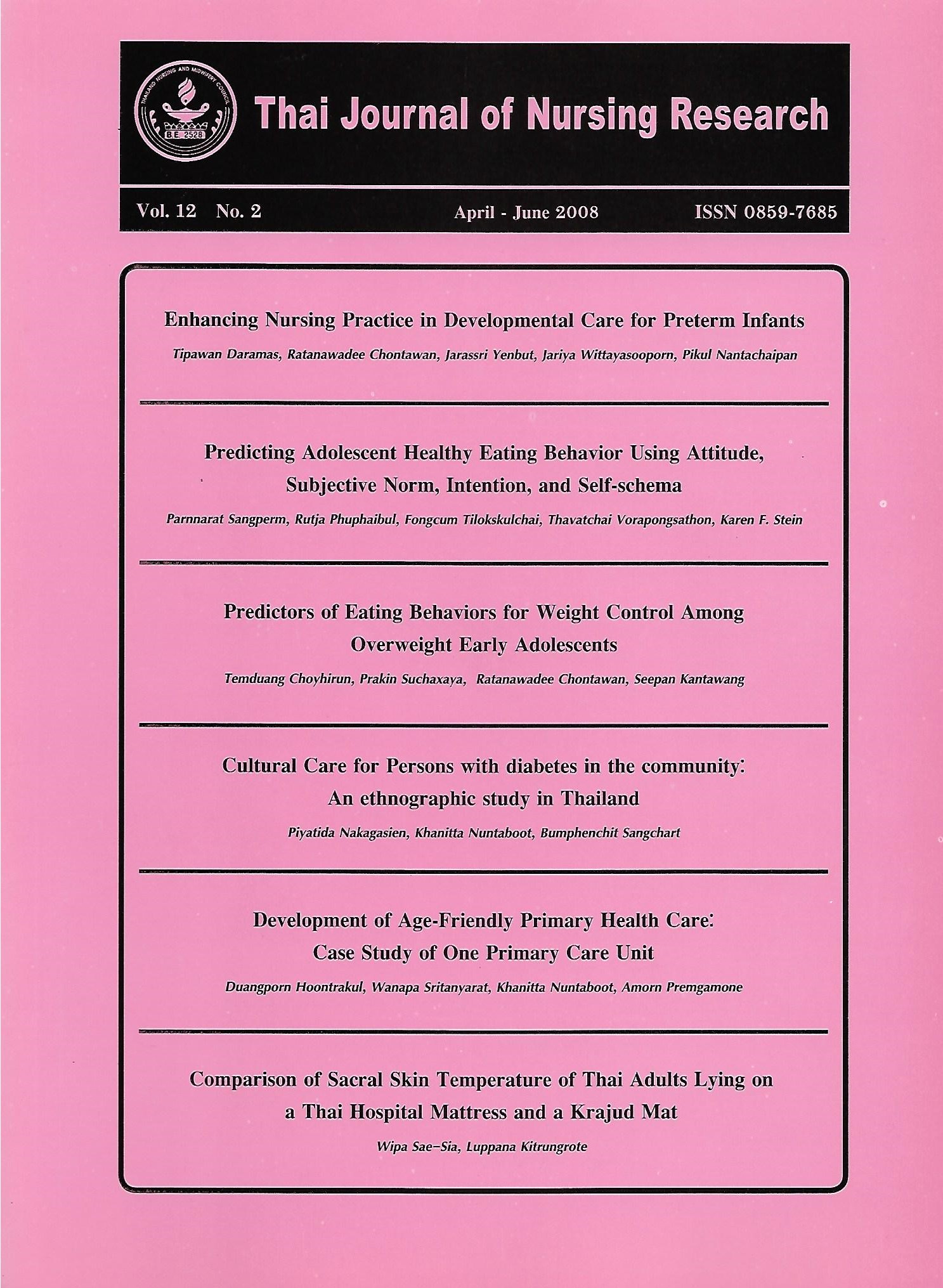Predicting Adolescent Healthy Eating Behavior Using Attitude, Subjective Norm, Intention, and Self-schema
Keywords:
วัยรุ่น, การรับประทานอาหารเพื่อสุขภาพที่ดี, ทฤษฎีแบบแผนสุขภาพอัตมโนทัศนเชิงโครงสร้างAbstract
บทคัดย่อ
พฤติกรรมการรับประทานอาหารของวัยรุ่นมีความเกี่ยวพันกับภาวะเสี่ยงต่อการเกิดโรค เรื้อรังในวัยผู้ใหญ่ การวิจัยครั้งนี้มีวัตถุประสงค์ที่จะทำนายพฤติกรรมการรับประทานอาหารเพื่อ สุขภาพที่ดีของวัยรุ่นตอนต้นในประเทศไทย โดยทัศนคติ ความคาดหวังของสังคม ความตั้งใจ และอัตมโนทัศนเชิงโครงสร้าง
กลุ่มตัวอย่างเป็นวัยรุ่นที่กำลังศึกษาในชั้นมัธยมศึกษาปีที่ 1 ถึง 3 จำนวน 191 คน จากโรงเรียน มัธยมศึกษาในเขตกรุงเทพมหานคร ตัวแปรทัศนคติ ความคาดหวังของสังคม ความตั้งใจ และ อัตมโนทัศนเชิงโครงสร้าง ประเมินโดยใช้แบบสอบถาม พฤติกรรมการรับประทานอาหารเพื่อ สุขภาพที่ดี ประเมินโดยใช้วิธีการเขียนบันทึกอาหารเป็นเวลา 3 วัน สารอาหารที่วิเคราะห์ได้จาก บันทึกอาหารของกลุ่มตัวอย่างแต่ละคนจะถูกนำมาเปรียบเทียบกับค่าแนะนำปริมาณสารอาหารที่ ควรไต้รับประจำวันสำหรับคนไทย พ.ศ. 2546 และธงโภชนาการ เพื่อนำมาคำนวณค่าดัชนีการรับ ประทานอาหารเพื่อสุขภาพที่ดี
ผลการศึกษาพบว่า ความคาดหวังของสังคมเป็นตัวแปรเดียวที่สามารถทำนายความตั้งใจ ได้ในกลุ่มวัยรุ่นโดยรวม (ท < .05) ทัศนคติสามารถทำนายความตั้งใจไต้ในกลุ่มวัยรุ่นหญิง ในขณะที่ อัตมโนทัศนเชิงโครงสร้างสามารถทำนายพฤติกรรมได้ในกลุ่มวัยรุ่นชาย
สรุปได้ว่า พฤติกรรมการรับประทานอาหารเพื่อสุขภาพที่ดีของวัยรุ่นตอนต้นเพศหญิง และเพศชายได้รับอิทธิพลจากปัจจัยที่แตกต่างกันดังนั้นในการส่งเสริมพฤติกรรมการรับประทานอาหาร เพื่อสุขภาพที่ดีในวัยรุ่นหญิงหรือชาย จึงควรใช้วิธีการที่แตกต่างกัน
คำสำคัญ: วัยรุ่น การรับประทานอาหารเพื่อสุขภาพที่ดี ทฤษฎีแบบแผนสุขภาพอัตมโนทัศนเชิงโครงสร้าง
Abstract
Eating behavior established in adolescence has been linked to the risks of many chronic illnesses in adulthood. The present study aims to predict healthy eating behavior in Thai early adolescents using attitude, subjective norm, intention, and self-schema. The participants were 191 early adolescents studying in grade 1-9 in public schools in Bangkok Metropolitan.
The questionnaires consist of the Attitude towards Healthy Eating Scale, the Subjective Norm for Healthy Eating Scale, the Intention to Eat Healthily Scale, and the Healthy Eater Self-Schema Scale. The Healthy Eating Index, using the Nutrition Flag and Dietary Reference Intake for Thai (DRI) 2003 as references, was used to determine healthy eating behavior of all participants through a 3-days food diary. All participants were also trained for food recording to ensure the accuracy of their intake data.
Results from hierarchical multiple regression revealed that subjective norm was the only significant predictor of healthy eating intention in all participants (p < .05). Only in the girls group that attitude could predict healthy eating intention. However, self-schema could predict healthy eating behavior in the boys group (p < .05).
These findings suggest that factors predicting healthy eating behavior among early adolescent girls and adolescent boys are different. Thus, different strategies based on specific cognitive factors should be employed when promoting healthy eating behavior in early adolescents.
Keywords: adolescent, healthy eating , Theory of planned behavior, self-schema
Downloads
How to Cite
Issue
Section
License
Copyright: The Pacific Rim International Journal of Nursing Research, Thailand Nursing & Midwifery Council has exclusive rights to publish, reproduce and distribute the manuscript and all contents therein.








.png)



